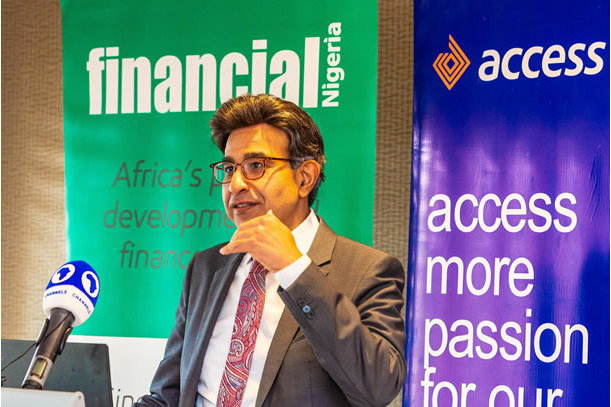Latest News
Banking stakeholders express commitment to sustainability

News Highlight
Participants who spoke at the event were unanimous in their view that a general adoption of Sustainability Standards will enhance current practice in the banking industry.
At a joint session on sustainability by Central Bank of Nigeria (CBN) and European Organisation for Sustainable Development (EOSD), which held on Wednesday in Abuja, senior executives from central banks, commercial and investment banks, payment services firms, and other stakeholders in the financial services industry expressed their commitment to sustainability.
The event was part of the pre-launch roundtable on the newly ratified Sustainability Standards and Certification Initiative (SSCI) 2.0 of the EOSD in West Africa. A similar event for the Development Finance Institutions (DFIs) in the sub-region held on Monday, also in Abuja. The CEO of the EOSD and Chairman of International Council of Sustainability Standards, Arshad Rab, was in the country to present the sustainability standards.
Speaking at the event, the Director of Banking Supervision, Central Bank of Nigeria, Mustafa H. Bala; and Special Adviser to the Governor on Sustainable Banking, CBN, Aisha Mahmood, said the CBN is fully committed to sustainability. According to the CBN officials, the apex bank has joined major global initiatives to make banks more responsive to global and local challenges, including climate change, while encouraging banks to manage environmental and social risks. Dr. Mahmood also announced that the CBN is currently reviewing the Nigerian Sustainable Banking Principles (NSBP) after 10 years of serving as a regulatory instrument for the banks.
While delivering the opening address, Chizoma Okoli, a Deputy Managing Director at Access Bank PLC, said the bank has continued to demonstrate long-term commitment to sustainability. As a result, Access Bank is the first African commercial bank to be SSCI-certified, in December 2020. She said the bank is a recognised leader in mainstreaming sustainability into banking and finance in Nigeria and Africa.
Philip Madamombe, the Director of Banking Supervision, Reserve Bank of Zimbabwe, joined the hybrid meeting from Harare and spoke about how the central bank is supporting the banks in his country to adopt sustainability standards. He highlighted the nexus between sustainability and compliance issues and said 9 out of the 19 banks in the country – including two systemically important banks – have adopted the SSCI standards.
During his presentation at the event, Omobolanle Victor-Laniyan, Head of Sustainability, Access Bank PLC, shared the experience of Access Bank as a Sustainability Certified Financial Institution. She said that although the bank had had a decade of implementing sustainability strategy before signing up to SSCI, the Sustainability Standards have proved to be a game-changer for the bank, helping to mainstream sustainability “holistically”, and the certification has enhanced the reputation of the bank and its ability to attract impact funding.
In his keynote presentation, Arshad Rab, said EOSD’s Sustainability Standards seek to enable key outcomes, which he enumerated as institutional sustainability, economic sustainability, social sustainability, and environment sustainability. This, he said, entails enhancing the quality of lives of people, promoting entrepreneurship, enabling inclusive prosperity, and preserving and promoting culture. According to him, this is imperative for creating a 21st century economy, which entails boosting the real economy, creating an innovation economy, and building economic resilience.
The SSCI, he said has over 200 targets that have been standardised, and yet customisable to local contexts, for achieving what he referred to as “holistic sustainability”. He said SSCI was developed to make sustainability the “business” of financial institutions, enhancing their profitability and long-term success, while mainstreaming social responsibility and environmental and biodiversity protection.
Over 120 senior executives, including bank CEOs, participated at the hybrid event, with 22 Nigerian financial institutions represented.
During the discussion session, participants who spoke at the event were unanimous in their view that a general adoption of Sustainability Standards will enhance current practice in the banking industry. According to the practitioners, this becomes even more imperative as the CBN is currently reviewing the NSBP.
The event was organised by Financial Nigeria International, the Nigeria Country Representatives to the European Organisation for Sustainable Development. Access Bank PLC was the sponsor of the event.
Related News
Latest Blogs
- How Tinubu is ensuring equitable access to public services
- Nigeria’s economic reform faces new threats
- What Ould Tah’s tenure at BADEA reveals about his AfDB candidacy
- Implementation strategy crucial for the success of 12-4 education policy
- A senator’s suspension threatens the right of representation
Most Popular News
- Artificial intelligence can help to reduce youth unemployment in Africa – ...
- Tariffs stir inflation fears in US but offer targeted industry gains ...
- Nigeria records $6.83 billion balance of payments surplus in 2024
- Tinubu appoints new Board Chair, Group CEO for NNPC Limited
- CBN net reserve hits $23.1 billion, the highest in three years
- Soaring civil unrest worries companies and insurers, says Allianz









